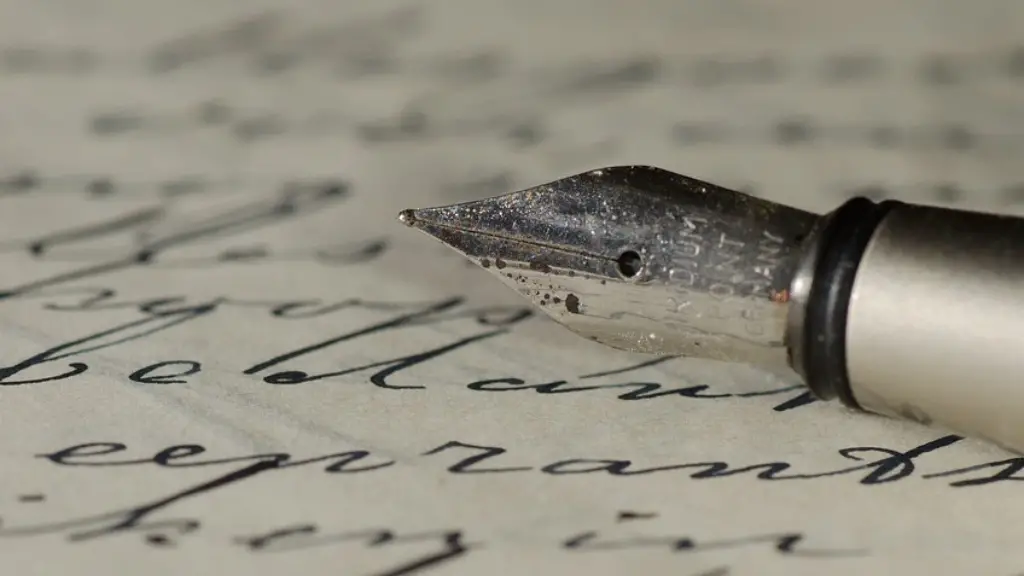How to write Poetry
Writing poetry is an art that many of us have no idea how to approach. It can seem daunting and overwhelming, and we often just give up before we even start. The truth is, though, that writing poetry is much easier than many of us think. Differentiating between different types of poetry can make all the difference when it comes to beginning to draft your own composition. Here are some of the basic guidelines for getting started.
First, decide what type of poem you want to write. Do you want to compose a sonnet? Try a haiku, or a villanelle? Explore different options such as odes, elegies, sestinas, and blank verse. Once you have identified the format of your poem, research its structure and required components. Knowing the best way to follow the rules of the poetic framework should make your composition process more efficient and successful.
Now it’s time to begin the creative writing process. Start thinking about what you want to express in your poem. Take this time to reflect on your life and experiences, and consider what would bring best bring out what you want to say. Choose a specific theme and stick to it throughout your poem. This theme can be something that has changed you, or something that has stayed the same. Decide on the tone you will use to speak about your theme. Consider whether you want the tone to be solemn, joyful, pensive, or something else.
Once you have determined the theme and tone of your poem, it’s time to begin constructing the narrative. Choose metaphors, symbols, and other literary devices to express your thoughts on the subject. Use punctuation like dashes, periods, and colons to create certain effects. Make sure to avoid cliches, as they can make your poetry seem unoriginal and dull. These tools will make your poetry more powerful, so take advantage of them.
Next, read your poem out loud. This will allow you to hear the sound of your writing and notice any repetitive words or phrases. By reading your poem aloud, you can start to visualize how the words work together and how different syllables interact with one another. Getting creative with assonance, alliteration, and rhythm can add a lot of dimension to your piece.
Lastly, continue to edit and refine your poem until you are completely satisfied with the words and their order. Show it to friends, family, or professors and get their feedback. Some of their constructive criticism about the structure and sound of your poem can be very helpful. Furthermore, having your work reviewed by people you trust and admire can be an invaluable experience.
Looking for Inspiration
Finding the motivation to write poetry can be a challenge. Start by reading the works of other poets. Keeping a journal is also a great way to brainstorm ideas and make note of emotions you’re feeling or images that come to mind. It can be something as simple as a haiku that you make up while you’re on the bus or a longer lyrical poem that you spend weeks perfecting. The most important point is to write the poem how it feels right.
It’s sometimes helpful to think of writing poetry like any other exercise, such as going to the gym or practicing an instrument. If it feels like too much when you first start out, try writing just a few lines each day. Eventually, going outside and jotting down some words or phrases in your journal will become second nature. Making time for writing can be difficult, but the end result can often be a masterpiece.
If you’re struggling to craft a poem that you’re proud of, take a break from it. Step away from your work and come back to it when you’re feeling refreshed and motivated. Alternatively, look for inspiration from other sources like song lyrics or books. They can help open your mind to new ways of expressing certain topics in a poetic way and offer a unique angle for your own work.
It’s important to remember that not all poetry has to be profound and riveting. Some of the most enjoyable poems are more playful and whimsical. Sometimes going with a tongue-in-cheek perspective can make the writing process more fun and creative. Fiction can be a great way to approach poetry; playing off of imaginative plotlines and settings can be a great source of inspiration.
Versatility in Poetry
Poetry is vast, and its categories and subgenres are infinite. Don’t be afraid to try writing a poem about something you might consider mundane—sometimes seemingly ordinary things can be put in an entirely new light if you put enough creativity and thought into them.
For example, descriptions of nature can make for beautiful poetry—from snowflakes to wildflowers. By exploring various literary devices and expressing your emotions, you might create something extraordinary. Similarly, think of writing a poem on something you feel strongly about, whether it be an issue or something more personal.
The possibilities are endless and should not be seen as intimidating. Keep in mind that many of the greatest poets were not immediately recognizable as exceptional; it’s likely that the creative geniuses we remember today were once inexperienced with poetry like many of us are. With time and effort, there’s no reason why your work can’t be just as striking if you put your all into it.
Create Your Own Voice
Another great way to create interesting poetry is to be brave and write in an unconventional way. Don’t be afraid to surprise your readers with new ideas and fresh methods of expression. Take risks, follow your own path and make sure that you’re comfortable with your style. Take the basics you’ve learned from your research and use it as a starting point but never limit yourself to what you think is expected. This will give your poetry a unique flavor and make readers take notice.
Don’t worry if your final poem falls short of perfection. Remember, poetry is also about trial and error; every draft and every mistake is a valuable lesson in its own right. Some of the most respected poets were prolific practitioners of this approach; their best works grew out of creative growth not immediate successes.
As always, trusting your own instincts is the single most important aspect of becoming a good poet. It might take some time to develop the confidence to go through with your ideas, but you must take that first step. Be courageous, take risks, and create a unique and powerful narrative. That’s the best way to write poetry that resonates.
Connecting with Others
The process of understanding and appreciating poetry is often enhanced by being able to share your work with others. It can be incredibly helpful to find a community of like-minded individuals to share your ideas and get feedback. A supportive group of friends and fellow poets can also offer you emotional support and understanding when you’re feeling stuck.
Find out if there are any poetry clubs or workshops near you where you can share your work and get feedback. You can also search online for resources like poetry websites, Twitter poetry hashtags, or writing forums. This can be a great way to get started, network and make connections with peers who share your same passions.
In today’s world, it’s easier than ever to get in touch with other writers and poets online. Talk to people who share your interests and concerns; get to know their work and collaborate with them. Not only can this be an excellent way to learn and improve, but it can also be a great source of inspiration and validation. As the saying goes, two (or more) minds are better than one.
Challenge Yourself
Regardless of experience or skill level, there is always something new to learn and explore when it comes to writing poetry. Try experimenting with different styles and formats and push yourself to create something unique. Reading different kinds of poems can help provide you with insight into different approaches and techniques.
The process of writing and creating poetry can take many forms and it can take you on a journey of self-discovery. During the writing process, it’s okay to wander off the beaten path and find something new. Writing poetry can be difficult, but it is also immensely rewarding. So don’t give up—you never know what masterpiece you might come up with.
Treating Criticism as Opportunity
Writing and reading poetry can be a powerful experience, and negative criticism, while discouraging, can be used in your favor by challenging you to improve. Don’t treat feedback as an attack on your writing; instead, look across it as an opportunity to grow. Remember that everyone has different opinions and preferences, but you can learn from each critic’s perspective.
Be sure to recognize that, ultimately, it’s all about improving your work and developing as a writer. Use negative feedback as an opportunity to improve and discover new approaches. It’s essential to not let the haters get to you, and instead, focus on constructive criticism. Take what will help you to bring your poem to the next level, and discard the rest.
If you talk to poets who have been writing for many years, you’ll find that dealing with criticism is a common theme. As a writer, finding out what works and what doesn’t can be incredibly helpful. Criticism should not be seen as a roadblock, but rather as a pathway towards improvement.
Moving Forward
Writing poetry doesn’t have to be intimidating; in fact, it should be liberating. Allow your thoughts and feelings to flow unbeaten and unfettered. Believe in your words and trust your own instincts. Whether it’s a short formal composition or a long epic, be proud of the words you create.
Your experiences and perspectives are valuable and can add something unique to the way you craft poetry. Please don’t be afraid to make mistakes; even the most respected writers are not without fault. Writing and editing poetry is a learning experience and can be a great way to develop as a poet. So take the plunge and get started on your writing journey today.





